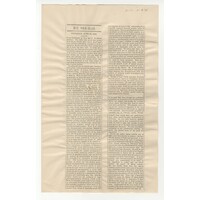Untitled
Metadata
Untitled
Publications & Reports
Bleek comments on the mutually assured destruction of the Western and Eastern parties forming parliament and the problematic pursuit of party politics or regional party interests above national interests, which should be their raison d'être. Cape Town-versus-Grahamstown factionalism unpopularly disrupts the colony's governance, with neither party advancing any great reformatory principles that might enrich deliberation with ideational diversity. Each party wants to maximise its power, even at the cost of overall efficacy. Equal representation for the provinces is necessary. Population alone cannot determine the number of House of Assembly representatives, and actual proportional representation would strongly favour the coloured and Bantu electors as the overall demographic majority. Their representation cannot be equal to their population size, nor can they be wholly excluded. Bleek proposes a middle way accommodating population size and fixed property value per district for fixing the number of representatives. On a population-based sliding scale, districts with more fixed property value averages per head deserve more representatives and adhere to a lower population threshold. Districts with low averages would have to meet a higher population threshold before they were entitled to send a representative primarily on the strength of their population. He criticises Dean Douglas' misinformation pamphlet naming Bishop Colenso. Bishop Gray's letters patent renders him a lay corporation with power over church property but does not give him secular jurisdiction. Bleek emphasises the impermanence of Gray's ex officio powers as a custodian charged to act lawfully and accountably despite apostolic pretensions. Were he to head a purely voluntary association like the Wesleyan church, he would be less impeded but devoid of such vested rights over ecclesiastical property should he separate from the main church. Lastly, the Bishop of Natal can exercise seniority over his clergy and, in that sense, has power over them. However, with no civil law jurisdiction, he must act through the civil courts to enforce valid demands in cases of disobedience. This distinction protects the clergy from despotic colonial bishops.
Printed newsprint glued on paper
22/06/1865
Two cut out columns of newsprint text, positioned vertically parallel, pasted onto a plus-sized A4 unlined sheet with visible warping. No title was subsequently handwritten onto the mount/paper backing.


Contributions